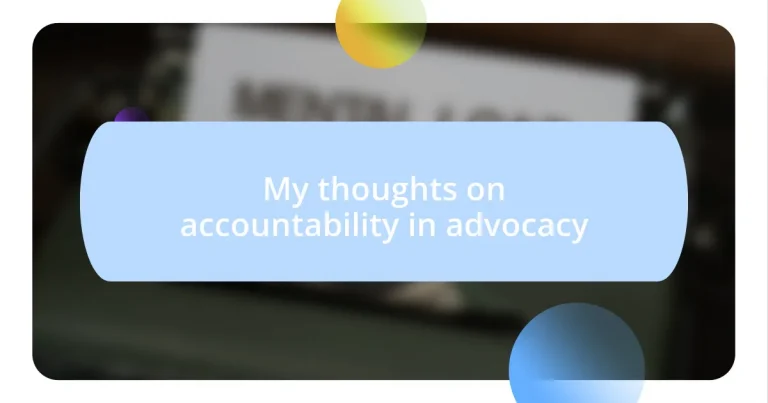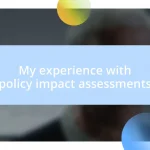Key takeaways:
- Accountability in advocacy involves transparency, clear expectations, and openness to feedback, which fosters trust and engagement within the community.
- Ethical advocacy is grounded in principles like integrity, respect, and inclusivity, shaping how advocates connect with and serve their communities.
- Utilizing technology and collaborative approaches can enhance accountability efforts, making stakeholder engagement more effective and transparent.
- Future advocacy initiatives must prioritize equity, ensuring all voices are heard in decision-making processes to create a more accountable environment.
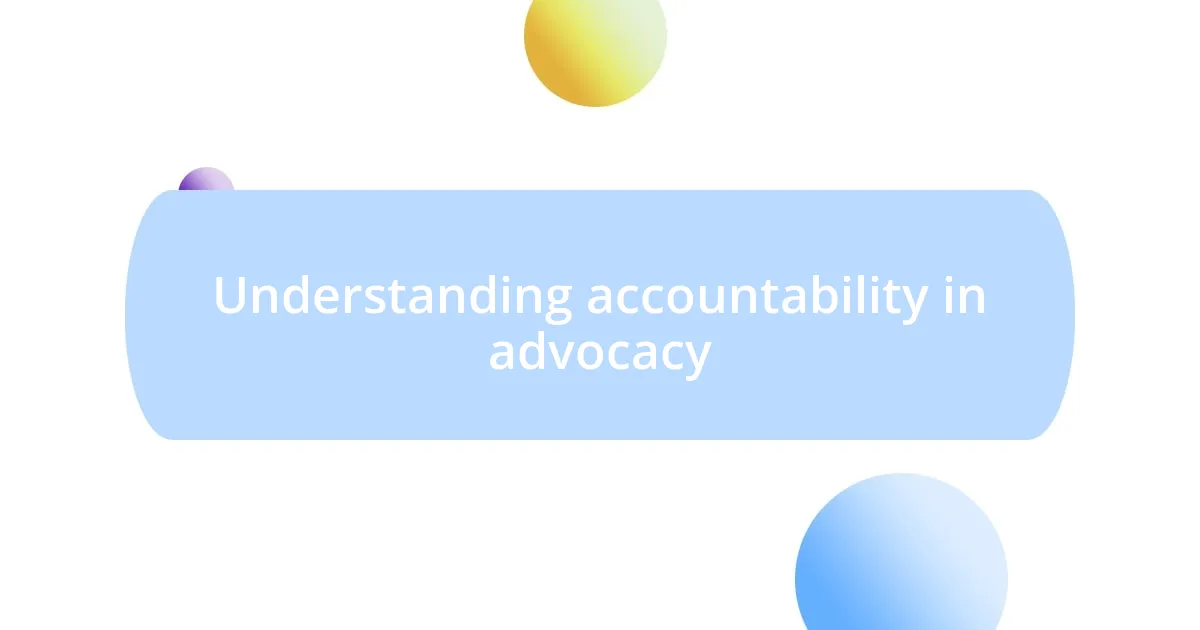
Understanding accountability in advocacy
In advocacy, accountability means being transparent and responsible for our actions and promises. I remember attending a community meeting where a leader faltered on their commitments. It struck me how essential it is for those in advocacy roles to not only speak but also to follow through—after all, how can we expect trust from those we aim to support if we don’t hold ourselves accountable?
I often wonder what happens when accountability falters in advocacy. For instance, there was a time when a critical initiative failed because stakeholders couldn’t agree on their responsibilities. This experience made me realize that clear expectations and mutual accountability aren’t just helpful; they’re vital for any advocacy effort. If we neglect this dimension, we risk undermining everything we’re fighting for.
Engaging with communities is a two-way street. I recall a specific project where regular feedback from those we were advocating for shaped our priorities. This experience taught me that accountability goes beyond just reporting results; it’s about genuinely listening and adjusting our approach based on the community’s needs. Isn’t that what true advocacy should be about—creating a narrative together rather than dictating one?
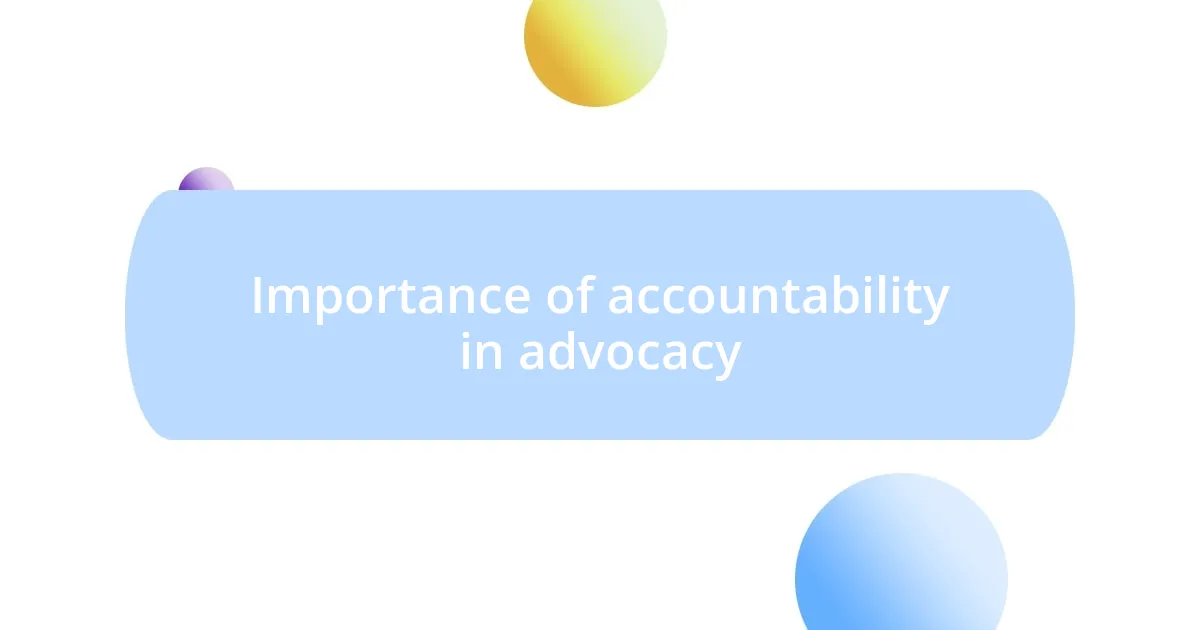
Importance of accountability in advocacy
Accountability in advocacy isn’t just a checkbox; it’s the backbone that holds everything together. I remember working on a project aimed at improving local education. When we set measurable goals and regularly updated stakeholders on our progress, the community became more engaged. They felt invested, knowing we were not just making promises but actively pursuing results. This level of transparency strengthened their trust in us.
The consequences of lacking accountability can be severe. In one instance, a group I collaborated with missed critical deadlines due to vague reporting structures. It was disheartening to see how quickly enthusiasm waned when people felt left out. It reinforced my belief that accountability fosters not just better outcomes but also deeper relationships. When advocates are clear about their commitments and the challenges they face, it encourages collaboration and a collective sense of purpose.
In my experience, being accountable means being open to feedback and willing to adapt. I once led an initiative that wasn’t producing the expected results, and it was humbling to admit that we needed to pivot. By actively seeking input from everyone involved, we not only salvaged the project but also built a stronger community connection. I learned that accountability isn’t always easy, but it’s essential for achieving the genuine impact we all strive for in advocacy.
| Accountability | Effect on Advocacy |
|---|---|
| Transparency in actions | Builds trust and engagement |
| Clear expectations | Reduces confusion and enhances collaboration |
| Openness to feedback | Encourages adaptation and improvement |
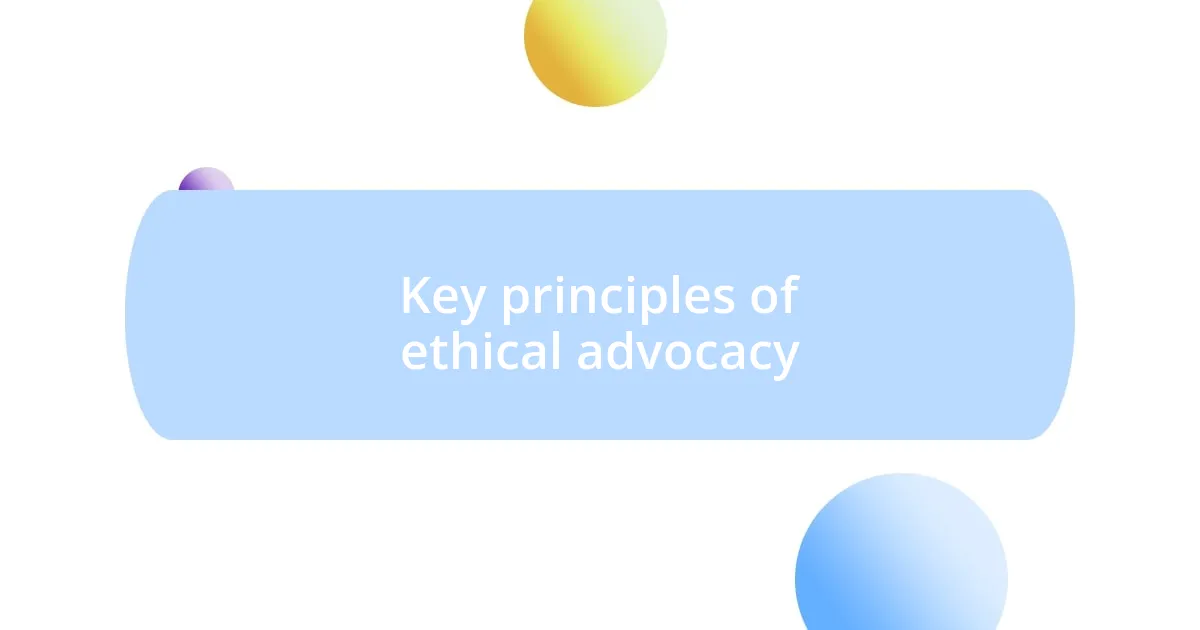
Key principles of ethical advocacy
Ethical advocacy hinges on a few key principles that guide our actions and decisions. For me, the most important one is integrity. I once faced a situation where I learned a partner organization was not fully transparent about their practices. It was a tough call, but I knew I had to address it openly. By prioritizing honesty, I not only safeguarded my values but also inspired others to hold themselves to the same standard. I often feel that when our foundation is built on integrity, we invite others to trust us more deeply.
Here’s a concise list of key principles that define ethical advocacy:
- Integrity: Upholding honesty in all interactions and communications.
- Transparency: Sharing information openly with stakeholders to build trust.
- Respect: Valuing the voices and experiences of those we’re advocating for.
- Inclusivity: Ensuring diverse perspectives are represented in decision-making.
- Accountability: Following through on commitments and being answerable for actions.
These principles resonate with me on a personal level, as they shape how I approach advocacy every day. I believe that by embodying these values, we create a more credible and connected community, where our efforts can truly flourish.
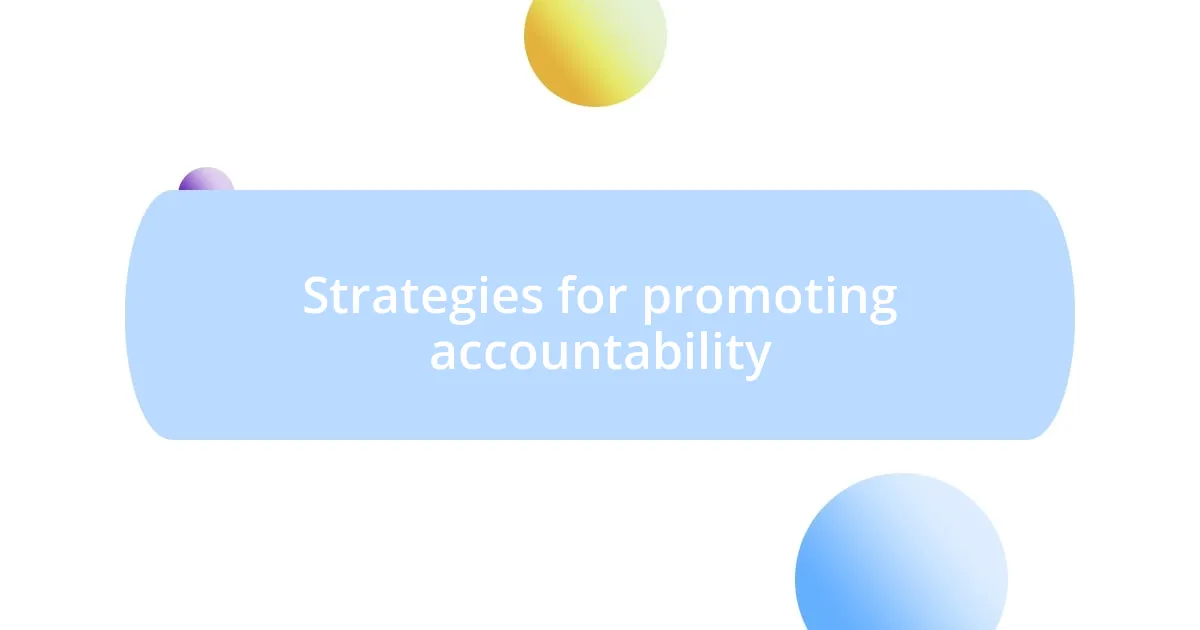
Strategies for promoting accountability
Promoting accountability in advocacy requires a strategic approach. One effective strategy I’ve found is creating a shared platform for stakeholders to access real-time updates on progress. When I facilitated a community-driven project, we utilized an online dashboard that showcased our milestones and challenges. This openness made everyone feel more engaged. It’s amazing how a bit of technology can transform how people relate to the work at hand, isn’t it?
Another valuable tactic is establishing regular check-ins with all involved parties. I remember scheduling bi-weekly meetings for a local initiative that initially struggled with communication. These meetings became a space for us to voice concerns, share successes, and reaffirm our commitments. It really fostered a culture of collaboration. Have you ever experienced that moment when everyone feels heard, and it ignites a sense of purpose? Those moments are priceless.
Lastly, it’s crucial to celebrate successes and acknowledge setbacks. During one of my advocacy campaigns, we took time to reflect on our efforts after reaching a major milestone. Recognizing what went right, as well as what we needed to improve, not only built trust but also kept the momentum going. I’ve learned that celebrating even small wins creates a powerful sense of community. How often do we stop to appreciate the journey instead of just the destination? Embracing this practice can enhance accountability tremendously.
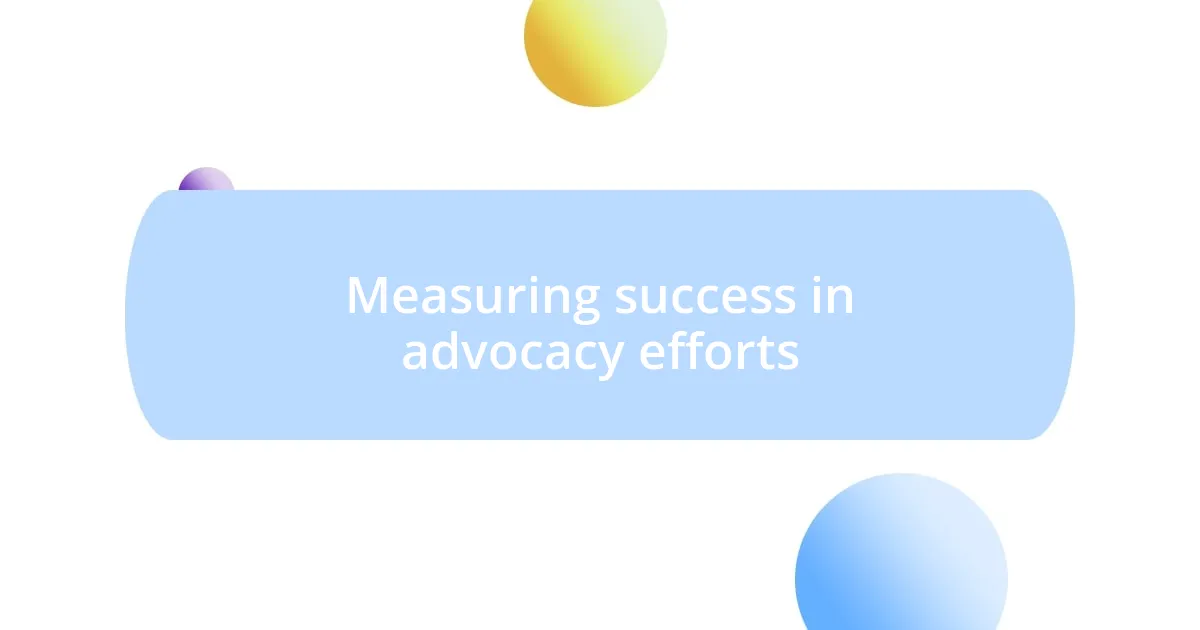
Measuring success in advocacy efforts
Measuring success in advocacy efforts isn’t just about the end result; it’s also about the journey. I recall working on a campaign for local environmental changes, where we set specific, measurable goals like reaching a certain number of community meetings. Each small gathering provided insights that helped refine our approach, making every meeting feel like a stepping stone towards our larger goal. Doesn’t it feel gratifying to track progress along the way, rather than only focusing on the finish line?
Another compelling aspect of measuring success lies in the stories we gather from those we serve. I once interviewed participants in a health initiative, hearing their firsthand accounts of how our advocacy efforts positively impacted their lives. These narratives not only showcased our impact but also reminded me that success translates into real, tangible changes for individuals. Have you noticed how powerful personal stories can be in illustrating advocacy wins? They add depth to otherwise dry statistics.
Finally, I’ve learned that feedback loops are essential in evaluating our work. In a project I led, we invited participants to share their thoughts and suggestions through anonymous surveys. The feedback was eye-opening; it highlighted both our strengths and areas needing improvement. How often do we pause to listen actively to our audience? This practice not only enhances our efforts but also reinforces accountability within our teams. The learning never stops, and that’s something I truly cherish in advocacy work.
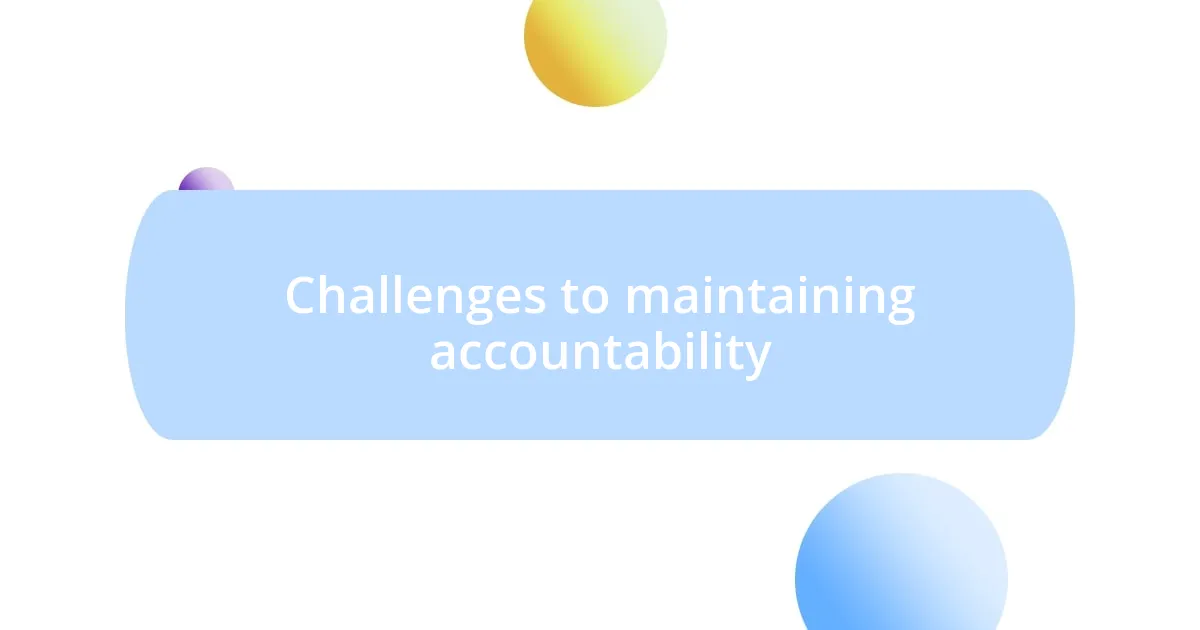
Challenges to maintaining accountability
One of the significant challenges I’ve faced in maintaining accountability in advocacy is the sheer diversity of interests among stakeholders. During a campaign I worked on, different groups had varying priorities, and it became tricky to align everyone toward a common goal. It left me wondering, how do we balance these sometimes conflicting views without losing sight of our mission?
Another hurdle I encounter often is the lack of transparency. In one instance, I was part of an initiative where decisions were made behind closed doors, leaving many feeling excluded and distrustful. This gap not only stifled open communication but also created a sense of disillusionment. Have you ever felt that weight of uncertainty when information is withheld? It can be demoralizing and makes fostering accountability feel like climbing a steep hill.
Additionally, resource limitations can greatly impede accountability efforts. I once led a small team that desperately wanted to implement a more robust follow-up system, but our budget didn’t allow for additional tools or personnel. It’s frustrating when passion and commitment are matched by a lack of means, isn’t it? Dealing with these constraints requires creativity and resilience, yet it does remind me how important it is to plan for sustainable advocacy from the beginning.
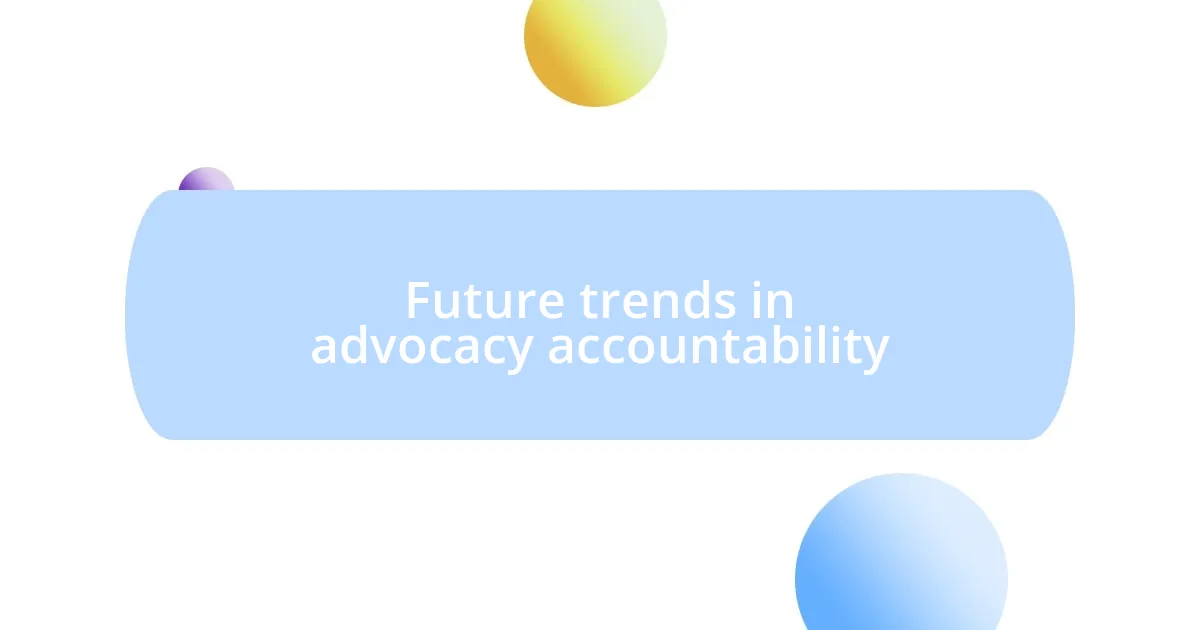
Future trends in advocacy accountability
Looking ahead, I see digital tools playing a crucial role in enhancing advocacy accountability. For instance, when I experimented with a project management app for tracking community feedback, the ability to see real-time updates changed everything. It was like shining a light on our progress and challenges. I often think about how tools like these can empower advocates to transparently share their journey. Are we not ready to embrace technology to bridge gaps in accountability?
Additionally, I believe that collaborative approaches will grow in importance. In one initiative, I organized a joint meeting with various stakeholders to compare our progress on shared objectives. The synergy was energizing; not only did we celebrate victories, but we also acknowledged setbacks together. How refreshing it felt to turn competition into collaboration! I see a future where alliances become the norm, driving collective accountability in advocacy.
Moreover, the focus on equity will undoubtedly shape future accountability efforts. I remember attending a forum where we collectively grappled with the disparities within our advocacy strategies. Some voices were louder than others, and I felt a call to action emerge from those discussions. It makes me wonder: how do we ensure every voice is heard in decision-making processes? As we move forward, I sense that embracing diverse perspectives will be essential for fostering a truly accountable advocacy culture.












